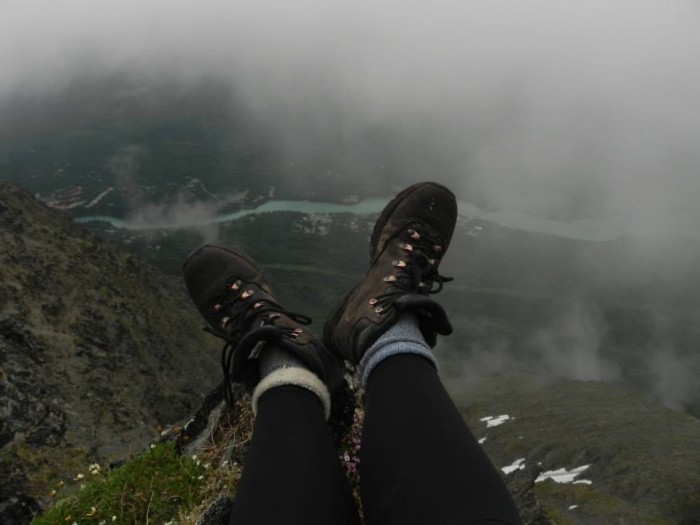“I don’t want to go swimming,” the girl with the curly, auburn hair said. “I’m too fat.”
“I don’t run,” said the girl with the big, blue eyes. “I mean, can you imagine me running?”
I hear these comments all the time. Hiking? I could never do that. I could never do yoga. I’d go to the gym if I looked better. I can’t wear swimsuits or yoga pants.
So many people, especially women, have expressed that they’d love to exercise, take up yoga, go hike in the mountains, have a day at the beach, or even swim at the local pool. They’d love to but they hear negative words in their minds: Fat. Ugly. Out of shape. Ugly. Overweight. Ugly. I’ve met them at tourist attractions, at study groups in college, in coffee shops, in passing conversations when someone brings up what she’d like to do for a summer vacation. They are relatives, friends, and passing acquaintances, people in real life, and strangers I’ve connected with online through blogs and Twitter.
The girls I spoke to were not ugly. If anything, they were remarkably pretty. They had great hair, and beautiful smiles, and eyes that looked kind and welcoming. However, in today’s society where beauty, happiness, and health are so often conflated with thinness, these girls did not feel beautiful. They didn’t feel strong or active. They couldn’t see the rewards of activity, outdoor adventures, or beach days. They could only see the parts of themselves that made them feel insecure.
All around, we see ads telling the world what a healthy, active body looks like. The recently controversial beach body ads, for example, tell women that unless they look like models they are not “ready” to go to the beach. Advertisers are always selling products to fix people. Just buy this formula, or try this detox! Tomorrow you can go out. Tomorrow you can enjoy life. Today, you need to be fixed.
On the one hand, many people think these messages are okay. After all, obesity is a very real problem in many countries, especially the US. There are real health risks associated with being overweight. After all, some people say, if it encourages someone to be healthy, what’s the harm?
The trouble is, there is harm. The girls I spoke to wanted to be active and exercise. However, the focus on looks and body image was actually preventing them from living healthy, happy lives. They weren’t avoiding exercise because they were lazy. In fact, they were all hard-working, responsible woman, with steady jobs and college educations.
They were avoiding exercise because they were afraid of what other people might say–bullying and snide remarks, and of billboards asking if they were beach ready. One look at the internet comments left for plus-sized models shows that these fears aren’t unfounded.
Additionally, health and weight are not always connected. While excessive weight can cause serious health problems, advertisers sell an image of beauty that is not at all reflective of a healthy body. I have met tremendously athletic people, people who climbed mountains and did thru-hikes, who thought they were overweight simply because they were not genetically a 90-pound Amazonian. On the other hand, many naturally thin people think they have a free pass to live unhealthy lives. One of the thinnest girls I have ever met ate a steady diet of canned cheese and crackers. She was skinny, but her constant stomach aches, high stress, and lack of energy showed that she was a far cry from healthy.
This focus on a skinniness is the opposite of health. It does not encourage people to exercise and eat healthy foods. Instead, it encourages people to buy products and miracle cures. Instead of adventuring, exercising, and having great experiences, weight shaming tells people to stay indoors, be depressed, and that they have less value than thinner people.
My own struggle with body acceptance has been a long one. I remember the first time I decided I wasn’t pretty. I was in grade school, new in town, generally an awkward kid who struggled making friends. I saw an ad at a clothing store, and for the first time I realized that I was supposed to look like that. And I didn’t. A combination of shyness, frequent moving, and now this body shame kept me more and more indoors, escaping into books and movies instead of the outdoors activities I had loved. When my mother suggested that I take part in a local run, I refused, certain that I would be humiliated as the most out of shape, ugly girl in the race, almost guaranteed to finish last.
As a teen, the posters and images became even more oppressive in my mind. I gained weight with puberty through my sedentary lifestyle. When I looked in the mirror, I saw fat thighs, a newly obtained bottom that I was not used to at all, a weak stomach, flabby arms. I was new, once again, starting over in a new state. A young adult novel I read gave me an idea for how to take control of my life, and certainly become pretty and popular. I’d just stop eating. Within a few months, I dropped down to a size 0.
I have never been unhealthier in my entire life. My long, blond hair, which I had always been proud of, started falling out in dull, grayish clumps. My fingernails became curved and brittle. My skin broke out, and turned a sort of yellow-green color. My cheeks were hollow. I was anxious and moody all the time, and suffered from constant stomach problems and headaches. Most damaging of all, I started to suffer from low blood sugar and anemia, two health conditions I have to this day. I was not active, because I was too tired to be active. I was not pretty or popular. I was anxious, insecure, and always fretting over finding the nearest scale.
I didn’t feel at home in my body, even when I was model-thin. On days I could make myself up to look healthier than I was, I still felt uncomfortable with myself. I couldn’t take compliments. I didn’t want people to see me. Every day, I woke up depressed, my blood sugar levels making me jittery and nervous. In social groups, I found I didn’t want to speak, because I didn’t even like the sound of my voice. I realized, at around seventeen, that there was nothing about myself that I liked. I wanted to be a brave, wild, free spirit, running through the woods and having adventures.
Instead, I was cranky, self-obsessed, and deeply unhealthy.
I’m not even entirely sure when I changed, or why. But I remember one day deciding that I was going to join my family at pizza night, and found myself eating six slices like a starving person. I was a starving person! I also began to think about food, about my body, about health in a different way. I had been eating tiny portions of mostly junk food, instead of healthy portions of good foods. There were days coming out of anorexia when I found myself delighting in the textures and colors of the pastas and salads I was learning to prepare.
At around this time, I also gave up meat. As I began to show more love to my body, I realized I didn’t want to be eating animal bodies. I needed to show love to myself, but I also needed to come outside of myself and my obsession with my looks, and think about others, both people and animals. Thinking about the right way to treat others made me think about the right way to treat myself. Thinking about the workers and the animals behind the foods we eat was a huge part in changing how I thought about life.
I still struggled with feeling comfortable with myself. It took me several years, for example, to not listen to strangers saying, “Smile for me!” or to stand up for myself against workplace bullies. I even cut my hair short for a time, hoping it would make me feel more serious and adult. But, from changing my health habits, I realized that I could also change my life choices.
I had randomly picked up a few hiking adventure books from the library. I realized that these were stories about people, just like anyone else, who simply chose to hike across the country or climb mountains. They were different sizes, had different abilities, some suffered from chronic illnesses, another was partially paralyzed. What they had in common was that they chose to live the way they wanted, now, not waiting to be someone else’s idea of perfect. They weren’t putting their lives on hold to buy a miracle cure or beauty treatment. They just went. I realized that seeking out adventure wouldn’t make me an impostor, that this wasn’t something for other people. Being adventurous, confident, and brave was a choice, and I realized I could make it.
More personal essays on Voices: How a Balinese Spiritual Healer Brought Me Back to Life
Why I Am Not Embracing the Big Butt Trend
Get more like this–sign up for our newsletter for exclusive inspirational content!
__
Photo: Chloe Donaldson






